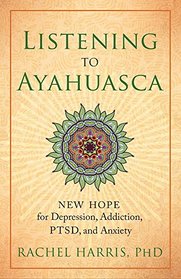Search -
Listening to Ayahuasca: New Hope for Depression, Addiction, PTSD, and Anxiety
Listening to Ayahuasca New Hope for Depression Addiction PTSD and Anxiety
Author:
Used for over 8000 years as a medicine in the Amazon rainforest, ayahuasca is a powerful psychedelic with a fully formed shamanic cosmology. Central to the indigenous belief system is the plant teacher, Grandmother Ayahuasca, who communicates with people both during and after ceremonies. DMT (Dimethyltryptamine), the active ingredient in ayahuas... more »
Author:
Used for over 8000 years as a medicine in the Amazon rainforest, ayahuasca is a powerful psychedelic with a fully formed shamanic cosmology. Central to the indigenous belief system is the plant teacher, Grandmother Ayahuasca, who communicates with people both during and after ceremonies. DMT (Dimethyltryptamine), the active ingredient in ayahuas... more »
ISBN-13: 9781608684021
ISBN-10: 1608684024
Publication Date: 2/14/2017
Pages: 320
Rating: ?
ISBN-10: 1608684024
Publication Date: 2/14/2017
Pages: 320
Rating: ?
0 stars, based on 0 rating
Genres:
- Health, Fitness & Dieting >> Mental Health >> Depression
- Health, Fitness & Dieting >> Mental Health >> Anxiety Disorders
- Health, Fitness & Dieting >> Mental Health >> Post-traumatic Stress Disorder
- Health, Fitness & Dieting >> Addiction & Recovery >> Drug Dependency
- Religion & Spirituality




